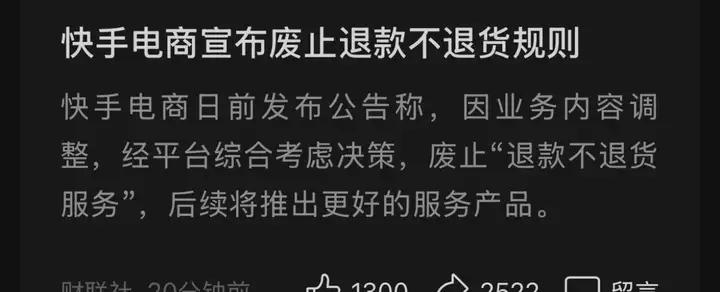KuaiShou's Refund-Only Policy Reversal: A Turning Point in E-commerce
KuaiShou’s decision to abolish its refund-without-return policy marks a significant shift in China’s e-commerce landscape, potentially signaling the end of an era dominated by consumer-centric refund policies.

Over the past decade, China’s e-commerce sector has witnessed a remarkable evolution in its refund policies, with the refund-without-return approach becoming increasingly prevalent. However, KuaiShou’s recent announcement to abolish this policy represents a pivotal moment in the industry’s development.
The refund-without-return policy, initially popularized by Pinduoduo in China, created a complex dynamic in the e-commerce ecosystem. While it appeared to favor consumers, its implications were far-reaching and ultimately destructive. This policy allowed customers to receive refunds while keeping the products, essentially creating a zero-cost purchase system that severely impacted merchants' sustainability.
The primary issue with this policy lies in its economic implications. When merchants face losses from refund-without-return transactions, they typically respond in one of two ways: either by increasing prices to offset potential losses or by reducing product quality to maintain profit margins. This creates a vicious cycle where declining product quality leads to more refund requests, further exacerbating the problem.
KuaiShou’s decision reflects growing recognition of these systemic issues. Traditional e-commerce platforms like Taobao and JD.com historically maintained stricter refund policies requiring product returns, which helped maintain a balance between merchant and consumer interests. The shift away from refund-without-return policies suggests a return to more sustainable business practices.
This change also highlights the evolving maturity of China’s e-commerce market. While aggressive consumer-friendly policies helped platforms attract users initially, the focus is now shifting toward sustainable growth and balanced merchant-consumer relationships. The move may impact short-term platform growth but promotes long-term market health.
For merchants, this policy reversal provides relief from what many considered an unsustainable burden. Small businesses particularly struggled with the financial impact of refund-without-return policies, often operating on thin margins that couldn’t absorb such losses. KuaiShou’s decision may encourage other platforms to reassess their policies, potentially leading to industry-wide changes.
The impact on consumer behavior will be significant. While some users have grown accustomed to refund-without-return policies, this change forces a return to more traditional e-commerce practices where purchases carry greater commitment and responsibility. This might lead to more thoughtful purchasing decisions and reduced frivolous returns.
As the e-commerce landscape continues to evolve, KuaiShou’s policy change may mark the beginning of a new era in Chinese e-commerce, one that prioritizes sustainable business practices over short-term growth tactics. The success of this transition will depend on how well platforms balance consumer protection with merchant sustainability, ultimately determining the future direction of online retail in China.